In 2020, nationwide protests following the murder of George Floyd led to what some called a period of racial reckoning.
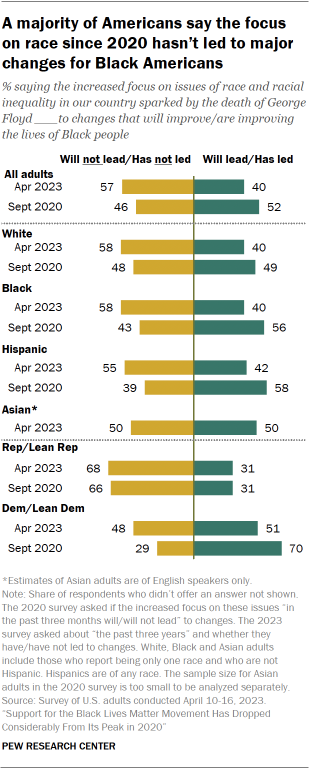
Three years later, 40% of Americans say the increased focus on race and racial inequality since 2020 has led to changes that are improving the lives of Black people, compared with 57% who say it hasn’t.
In 2020, 52% of Americans predicted the increased focus on issues of race and racial inequality would lead to changes, a slightly higher share than the 46% who said it would not.
Views by race and ethnicity
White, Black and Hispanic adults offer similar views on whether the focus on issues of race and racial inequality has led to major changes that are improving the lives of Black people. In each of the groups, more say it hasn’t than say it has led to major changes. Views among Asian adults are split (50% give each answer).
Today, White, Black and Hispanic adults are less likely to say the focus on these issues has led to changes that are improving the lives of Black people than they were in 2020 to predict it would lead to such changes.
Views by party
About half (51%) of Democrats and Democratic leaners say the increased focus on racial issues in the past three years has led to changes that are improving the lives of Black Americans, compared with 31% of Republicans and those who lean to the GOP.
In 2020, 70% of Democrats said they expected the increased focus on race would lead to changes that would improve the lives of Black people. Views among Republicans remain unchanged from 2020.
Views of the treatment of Black and White Americans in society
Most Americans (67%) say that Black people are treated less fairly than White people when it comes to dealing with the police. Across a range of other settings and situations, the public is more divided over whether Black people are treated less fairly or whether their treatment is about equal to that of White people. These views remain largely unchanged from 2019.
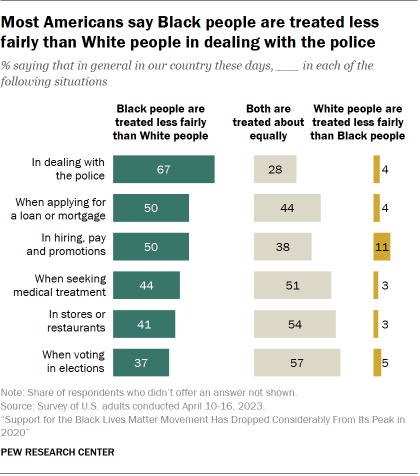
Half of Americans say Black people are treated less fairly than White people when applying for a loan or mortgage, or in hiring, pay and promotions. Some 44% say Black and White people are treated about equally when applying for a loan or mortgage, and 38% say this about hiring, pay and promotions.
Smaller but sizable shares say Black people are treated less fairly when seeking medical treatment, in stores or restaurants and when voting in elections.
Views by race and ethnicity
On all items, Black, Hispanic and Asian adults are more likely than White adults to say Black people are treated less fairly than White people. But Black adults are the most likely to say that Black people are treated less fairly in these situations, with about seven-in-ten or more expressing this view on each item.
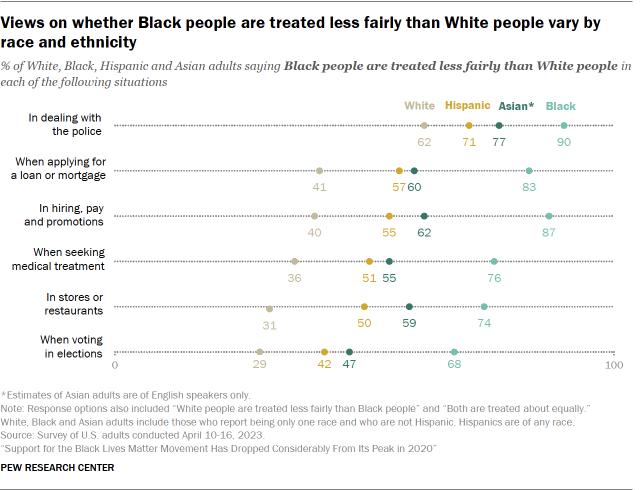
The only item where a majority of White adults say Black people are treated less fairly is in dealing with the police (62% say this). This has also been the case in past surveys. On all other items, pluralities of White adults say Black and White people are treated about equally.
Views by party
By margins ranging from 44 percentage points (in stores or restaurants) to 53 points (in hiring, pay and promotions), Democrats are far more likely than Republicans to say Black people are treated less fairly than White people in the situations asked about.
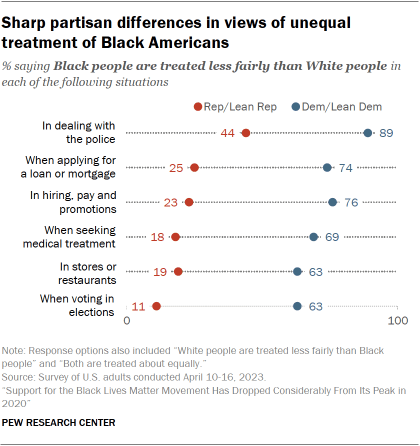
Most Democrats say Black people are treated less fairly on each item. Fewer than half of Republicans say Black people are treated less fairly in dealing with the police, and a quarter or fewer say the same about the treatment of Black people in each of the other situations.
Among both Democrats and Republicans, more say Black people face less fair treatment in dealing with the police than say this about any other situation in the survey.
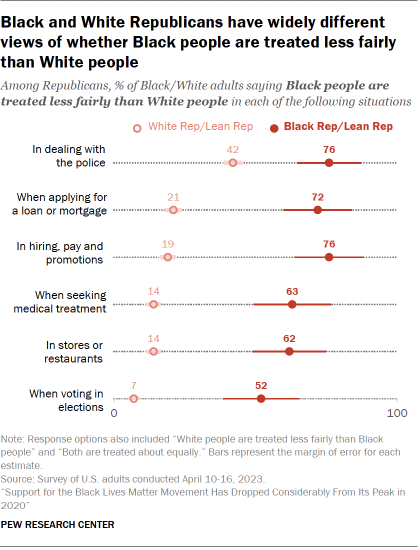
Black and White Republicans have very different views about whether Black people are treated less fairly than White people. In fact, in almost all the situations asked about, majorities of Black Republicans say Black people are treated less fairly, compared with about four-in-ten or fewer White Republicans who say this on each item.
Majorities of White and Black Democrats say Black people are treated less fairly in dealing with the police, and both racial groups are equally likely to say this. On all other items, Black Democrats are more likely than their White counterparts to say Black people are treated less fairly in each of these situations.
Views of the impact of race and ethnicity on a person’s ability to get ahead
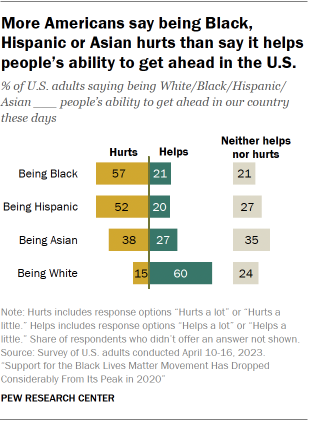
When asked if being White, Black, Hispanic or Asian helps or hurts people’s ability to get ahead in our country these days, more Americans say being Black, Hispanic or Asian hurts than say it helps. In fact, 57% say being Black hurts (either a lot or a little), followed by 52% who say the same about being Hispanic and 38% who say this about being Asian. Just 15% say being White hurts a person’s ability to get ahead.
Six-in-ten Americans say being White helps a person’s ability to get ahead, with 42% saying it helps a lot. Some 27% say being Asian helps, followed by about one-in-five who say this about being Black (21%) or Hispanic (20%).
Those who say being Asian hurts a person’s ability to get ahead (38%) is higher than the shares who said this in 2020 (32%) and 2019 (21%).
Views by race and ethnicity
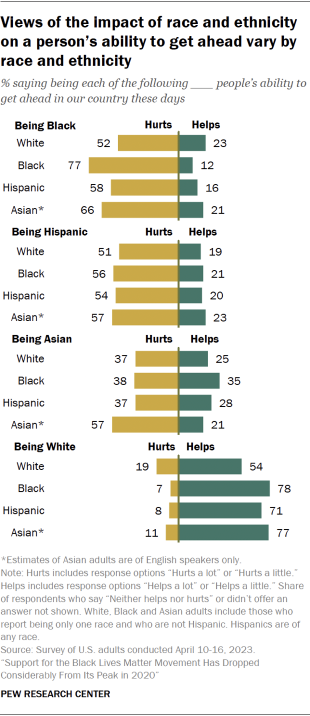
About half or more of White, Black, Hispanic and Asian adults say being Black or Hispanic hurts – and being White helps – a person’s ability to get ahead. But there are significant differences across groups in these views.
Black adults are more likely than the other groups to say being Black hurts. In fact, 57% of Black adults say it hurts a lot, compared with 38% of Asian adults and about a quarter of White and Hispanic adults (23% and 27%, respectively).
About one-in-five White adults say being White hurts a person’s ability to get ahead, larger than the shares of Black, Hispanic and Asian adults who say the same. And while a majority of White adults say being White helps, they are the least likely to say this.
Majorities of Black (71%) and Asian (63%) adults say being White helps a lot in getting ahead, compared with 53% of Hispanic adults and 33% of White adults.
Some 57% of Asian adults say being Asian hurts, compared with about four-in-ten or fewer among other groups. Views on whether being Hispanic helps or hurts are less pronounced by race or ethnicity.
Views by party
Republicans are divided as to whether being Black in the U.S. hurts or helps a person’s ability to get ahead: 33% say it helps, 34% say it hurts and 31% say it neither helps nor hurts.
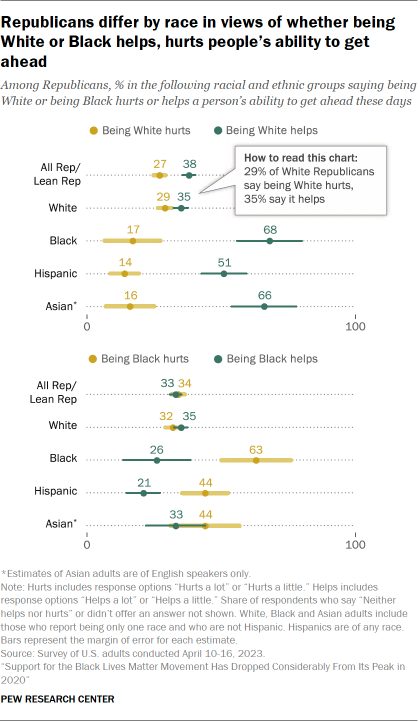
Meanwhile, Democrats are much more likely to say that being Black hurts – 79% say this, with 48% saying it hurts a lot. Democrats are also more likely than Republicans to say being Hispanic or Asian hurts a person’s ability to get ahead.
When it comes to Republicans’ views of the impact of being White, 38% say it helps, 27% say it hurts and 34% say it neither helps nor hurts. Democrats’ views are more uniform: 82% say being White helps a person’s ability to get ahead, with 66% saying this helps a lot.
Among Republicans, those who are Black (68%) or Asian (66%) are the most likely to say being White helps a person’s ability to get ahead, followed by 51% of Hispanic Republicans and 35% of White Republicans.
A majority of Black Republicans (63%) say being Black hurts a person’s ability to get ahead, higher than the shares of White, Hispanic and Asian Republicans who say the same.
There are also differences by race and ethnicity among Democrats, but they are less pronounced than the differences among Republicans.




